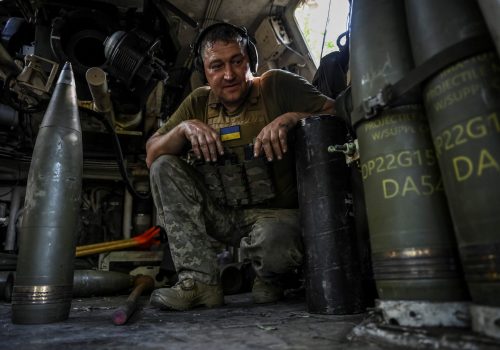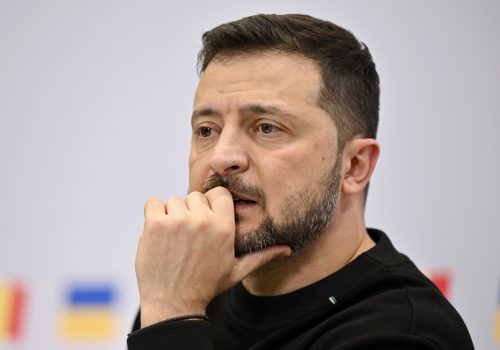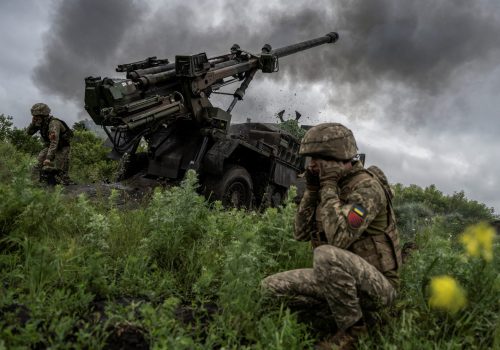On the very first day of Russia’s full-scale invasion in February 2022, a Russian warship approached the tiny Ukrainian garrison on Snake Island with an ultimatum: “Lay down your arms and surrender, or you will be bombed.” Although hopelessly outnumbered and outgunned, the handful of Ukrainian troops stationed on the Black Sea island had no intention of complying. “Russian warship, go f*** yourself,” they replied.
This defiant response would soon echo across Ukraine and around the world, becoming an unofficial slogan that captured the fighting spirit of Ukraine’s remarkable resistance to the Russian invasion. Within days, it was adorning T-shirts, billboards, bumper stickers, and fridge magnets, while serving as inspiration for an entire genre of patriotic memes on social media. The incident even prompted Ukraine’s national postal service to issue an iconic stamp.
The defiance displayed by the defenders of Snake Island set the tone for the war at sea, which has seen Ukraine achieve a frankly stunning string of successes against the Russian Black Sea Fleet despite not possessing a fleet of its own. Indeed, while attention is currently focused on the largely static front lines of the conflict in southern and eastern Ukraine, there are mounting indications that Ukraine is now winning the Battle of the Black Sea.
Stay updated
As the world watches the Russian invasion of Ukraine unfold, UkraineAlert delivers the best Atlantic Council expert insight and analysis on Ukraine twice a week directly to your inbox.
The war at sea actually began days before the onset of the full-scale invasion, with Russian warships imposing a naval blockade on Ukraine’s Black Sea ports in mid-February 2022. At first, this maritime confrontation looked to be a foregone conclusion. With no navy to speak of, Ukraine appeared to have little chance of challenging Russian dominance of the Black Sea. However, it soon became apparent that such conclusions were premature.
In April 2022, Ukraine struck its first major blow in the war at sea by sinking the flagship of the Russian Black Sea Fleet, the Moskva, with two Ukrainian-produced Neptune anti-ship missiles. The symbolism of this strike was particularly strong as the Moskva was the same warship that had attacked Snake Island on the first day of the war and been told exactly where to go.
Two months later in June 2022, Ukrainian troops launched an audacious operation to liberate Snake Island itself. The victory served as a major morale boost for Ukraine while also marking a significant shift in the balance of power in the northwestern Black Sea close to Ukraine’s coastline and the country’s main ports. Summer 2022 also saw the first Ukrainian strikes on Russian naval targets in occupied Crimea, including attacks on the Russian Black Sea Fleet home port of Sevastopol.
The Battle of the Black Sea has escalated dramatically in recent months. Ukraine has used a combination of missile and drone strikes along with commando raids to hamper Russian naval operations, while also disrupting logistical hubs at a range of locations in occupied Crimea that are critical for the resupply of the Russian army in southern Ukraine.
Throughout the summer months, Ukrainian forces carried out precision strikes against Russian air defenses and other strategic targets across the occupied Crimean peninsula. This paved the way for devastating September attacks that seriously damaged a Russian warship and submarine at dock in Sevastopol along with the headquarters of the Russian Black Sea Fleet. Meanwhile, Ukraine was also active at sea, using innovative Ukrainian-produced naval drones to hit a Russian warship and army supply vessel in the Black Sea.
This campaign of drone and missile attacks has succeeded in forcing Russia to withdraw the bulk of its Black Sea Fleet from Sevastopol and retreat to ports in the eastern Black Sea. In early October, it emerged that the Kremlin plans to build a new naval base in the Russian-occupied Georgian region of Abkhazia on the eastern coast of the Black Sea. This is a further sign that Russian naval planners do not expect to overcome the maritime threats posed by Ukraine any time soon.
Eurasia Center events

Ukraine’s latest naval success came in early November, when a Ukrainian air strike using cruise missiles provided by France struck a Russian shipyard in occupied Crimea. The attack reportedly inflicted serious damage on a cruise missile-carrying corvette, the Askold, which is believed to be one of the newest warships in the Russian fleet.
In an unusual move, typically tight-lipped Kremlin officials publicly acknowledged that a warship had been damaged in the attack. Ukrainian Air Force officials trolled their Russian adversaries with a tweet featuring a photo of a Ukrainian jet mounted with cruise missiles and the caption: “How was your weekend?” Ukrainian President Volodymyr Zelenskyy was also upbeat about Ukraine’s progress in the Battle of the Black Sea, using his daily address on Monday evening to “thank everyone who ensured the successful destruction of the Russian warship in Kerch.”
Ukraine’s success at sea is a reminder that despite widespread talk of a stalemate, the Russo-Ukrainian War remains extremely dynamic. The progress made in recent months by Ukrainian forces in the Black Sea zone will not win the war, but it has already allowed Ukraine to resume merchant shipping from the country’s southern ports, providing Kyiv with a vital economic lifeline. As Crimea becomes increasingly untenable for Russian occupation forces in the coming months, this will strain logistical supply lines supporting the Russian army in southern Ukraine. Many in Kyiv now speculate that it is only a matter of time before Ukraine destroys the Crimean Bridge entirely and severs the link between the occupied peninsula and Russia itself.
The Battle of the Black Sea offers important lessons for Ukraine’s international partners. It demonstrates the effectiveness of Western arms against Russian defenses, while also underlining the Ukrainian military’s ability to deploy increasingly sophisticated weapons including French and British cruise missiles with a high degree of competence and professionalism. The Battle of the Black Sea has proved that Ukrainian courage and Western weapons are a winning combination. This should encourage Western leaders to stop hesitating and finally provide Ukraine with the tools it needs to win the war.
Peter Dickinson is editor of the Atlantic Council’s UkraineAlert service.
Further reading
The views expressed in UkraineAlert are solely those of the authors and do not necessarily reflect the views of the Atlantic Council, its staff, or its supporters.

The Eurasia Center’s mission is to enhance transatlantic cooperation in promoting stability, democratic values and prosperity in Eurasia, from Eastern Europe and Turkey in the West to the Caucasus, Russia and Central Asia in the East.
Follow us on social media
and support our work
Image: A man holds postal stamps showing Ukrainian service member and Russian warship depicting recently damaged guided missile cruiser "Moskva" (Moscow), at the headquarters of Ukrainian post in Kyiv, Ukraine April 14, 2022. REUTERS/Valentyn Ogirenko




